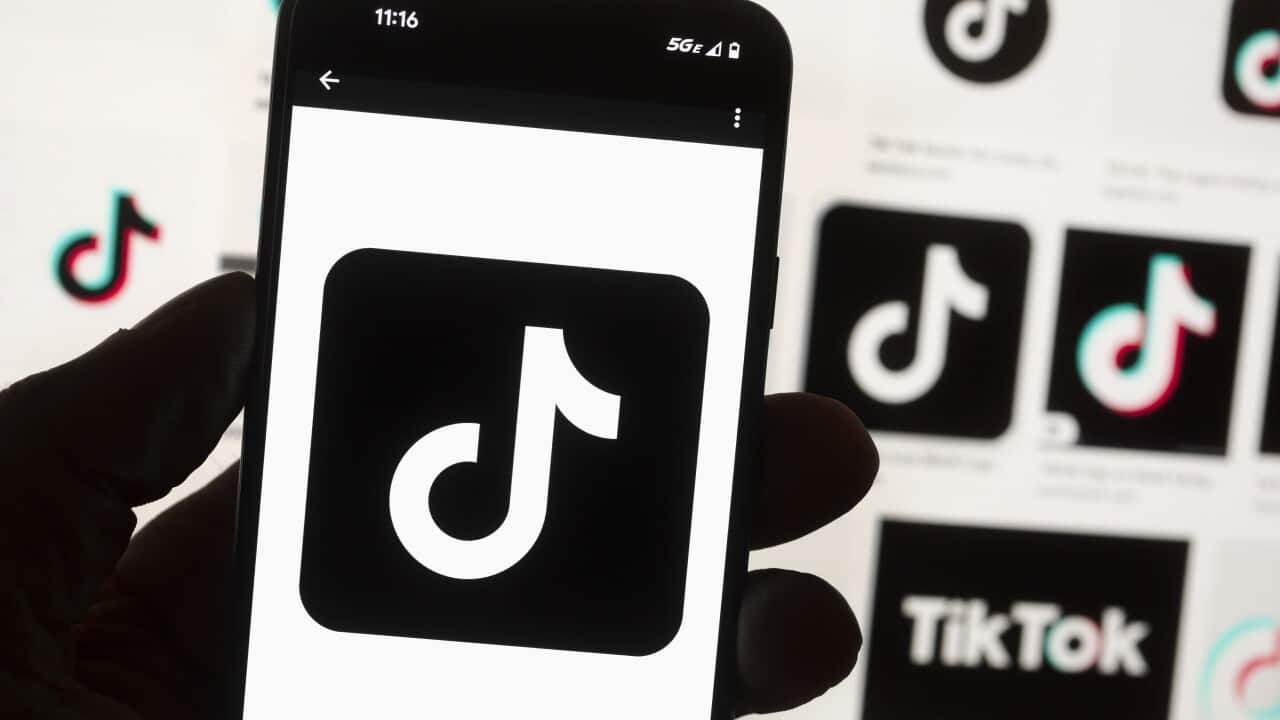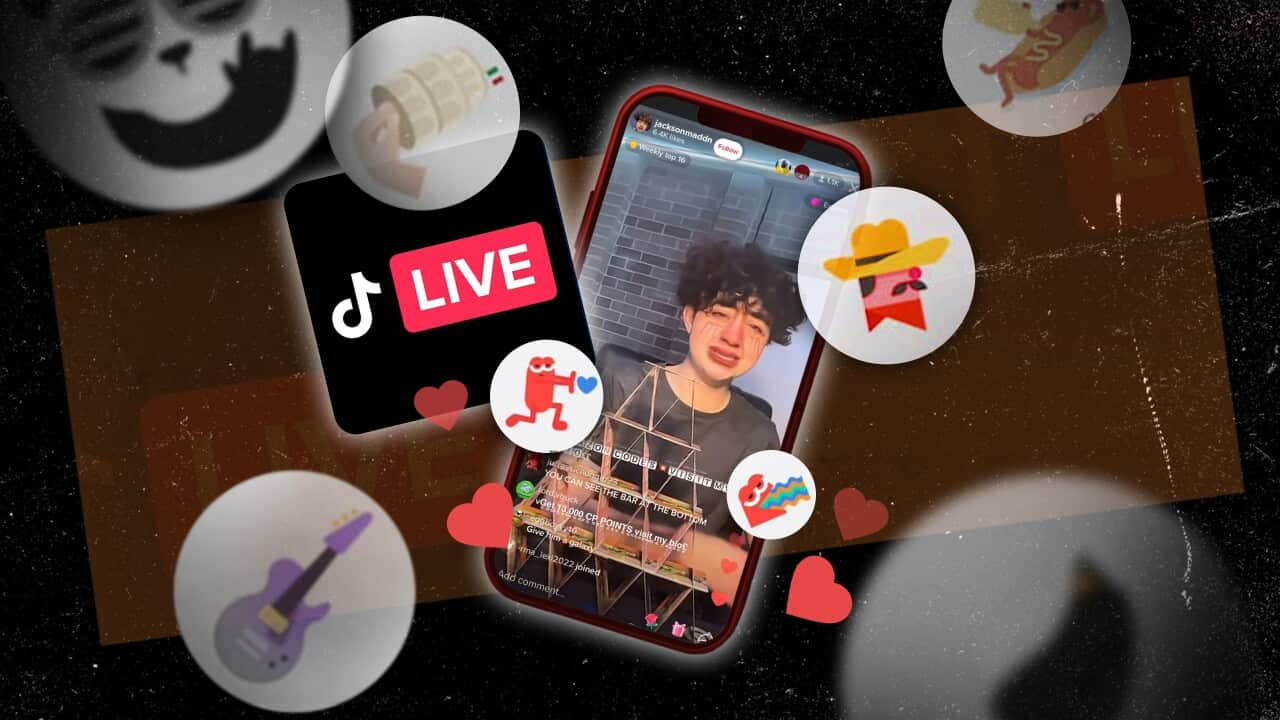Such is the power of TikTok, posting a dance challenge on the video platform can potentially make or break a musician's career.
The short video site has an estimated one billion monthly users and with that many eyeballs on posts, the platform is a huge promotional space for musicians and bands.
Musician Kira Puru said the platform began for her as a creative outlet and playful space but has now become a critical tool for promoting her work.
"The flavour of it for me has changed because it is now more closely related to work," Ms Puru told The Feed.

Independent musician Kira Puru uses Tiktok to create playful video content. Source: AAP / Joel Carrett
Ms Puru said people in the music industry need to use whatever tools they have available to help songs succeed.
"I am aware of how transformative TikTok and social media in general can be so I do want to be able to harness that energy and that momentum if I can," Ms Puru said.
But she also said the platform can breed a sense of feeling 'soulless' if what are often complex and 'heavy' topics are condensed into a 'bite-sized' clip.
While TikTok can spread joy to the audience through frivolous entertainment, there's other aspects to the site which have drawn criticism.
TikTok and its Chinese parent company ByteDance have faced heat over its algorithm, which can expose users to potentially risky content.
The 'number one' music discovery platform
It's clear young people are spending a lot of time on TikTok consuming musical content.
The Victorian Music Development Office, an initiative of the Victorian government, reports it has identified TikTok as the number one music discovery platform on social media for the 16-34-year-old age group.
That's based on the office's forthcoming Consumer Insights study.
"We've observed that two-thirds of viral TikTok hits are sparked by organic content," a statement from the office said.
For electronic act Shouse, the not-for profit group Music Victoria said that social media trends have likely helped the group enter the top 500 artists worldwide on Spotify.
The duo from Melbourne had large-scale success with their hit 'Love Tonight,' in 2021.
The track has had more than 300 million streams on Spotify but that has not necessarily transformed into Australian award wins for the group.
The tune was not eligible for Thursday night's ARIAs [Australian Recording Industry Association awards] due it its release date, being originally from 2017 but then re-released.

The site TikTok promotes music sharing. Source: AAP
The Kamilaroi artist won Best Artist and Best Pop Release at the 2021 ARIA Awards.
He is nominated this year for Song of the Year, Best Solo Artist, Best Hip Hop and Rap release, Best Australian Live Act and Best Pop Release for 2022.
The scale of the awards ceremony has been reduced over the past two years because of COVID-19 but will return to normal in Sydney on Thursday night.
How influencers have become central to music marketing
Darren Distefano is a regional account director with Collab Asia, a digital content and marketing agency covering the Asia Pacific region that helps link brands with influencers.
"We're actually one of the largest TikTok creator networks and we have very close relationships with record labels and song artists," he told The Feed.
"We connect brands and record labels with influencers across music, lifestyle and general entertainment."

Darren Distefano covers the Asia Pacific region in his marketing work. Source: Supplied / Huw Lambert
"Influencer marketing is now pretty much a staple in a record label's marketing budget," he said.
But Mr Distefano said it's up to the music groups to convert their following into income.
"We're finding that audience, it's now the brand's job albeit record labels and musicians to convert them into actual loyal customers," he said.
"Those algorithms are changing all the time which kind of keeps you constantly creating in different ways and kind of trying new ways to to make to convert new ideas into energy and that energy into ticket sales, or Spotify spins or merch [merchanise] sales," she said.
Music campaigns with hashtags or dance challenges increase the popularity of artists on TikTok.
"Our YouTuber’s in Indonesia did a cover to Blackpink’s “How You Like That” which garnered 10 million views in just 3 weeks and trended to #2 on the platform," Mr Distefano said.
"The record label reached out to us and we did a collaboration with a dance duo in the Philippines," he said of another campaign around Dua Lipa's single Physical.
"That actually got shared 11000 times on TikTok."
Equalising the industry
Laura Glitsos is a musician and Major Coordinator, Broadcasting and Digital Journalism at Perth's Edith Cowan University. She has argued that TikTok is democratising the music industry as part of its natural evolution.
"There are different ways to monetise content on TikTok," Ms Glitsos said.
She explained users can pay bands directly, and content creators can make money and earn kickbacks based on video views.
"You get sort of different accumulations of data that will tell TikTok to give you money or not," she said.

Kira Puru appeared at the 2019 ARIA awards in Sydney in 2019. Source: AAP / JOEL CARRETT/AAPIMAGE
And that branding, marketing, advertising and popular music have a long history together.
"It's always been entangled so I think it would probably be unfair to suggest that TikTok has somehow exploited this in a different way," she said.
Music Victoria said TikTok is changing how art is being consumed and it's a significant driver in how songs are discovered.
"Whilst some artists benefit from these changes, we've also seen artists struggle with the platform," chief executive Simone Schinkel said.
"Like all other music platforms out there, TikTok might not be for everyone, and that is okay."
"Artists should be encouraged to release and promote their music through channels that feel most comfortable to them and their fans," Ms Schinkel said.
Changing creativity

Kira Puru performs an outdoor show in February 2020. Source: SBS
"The song durations are getting shorter and shorter but you can tell they are purposely writing it for that 15 second riff on TikTok," Mr Distefano said.
Ms Puru agreed that some fans only know a short snippet of a song and the crowd can react to these short musical moments at live shows.
"I'm not marketing genius, I do not work in marketing," she said.
"I am an artist and although I enjoy interactions with my fans on social media like I would much rather be the studio writing music."
But Mr Distefano said artists need to strike a balance between catering for the platform and their fans.
"Audiences know whether they are being sold something."



